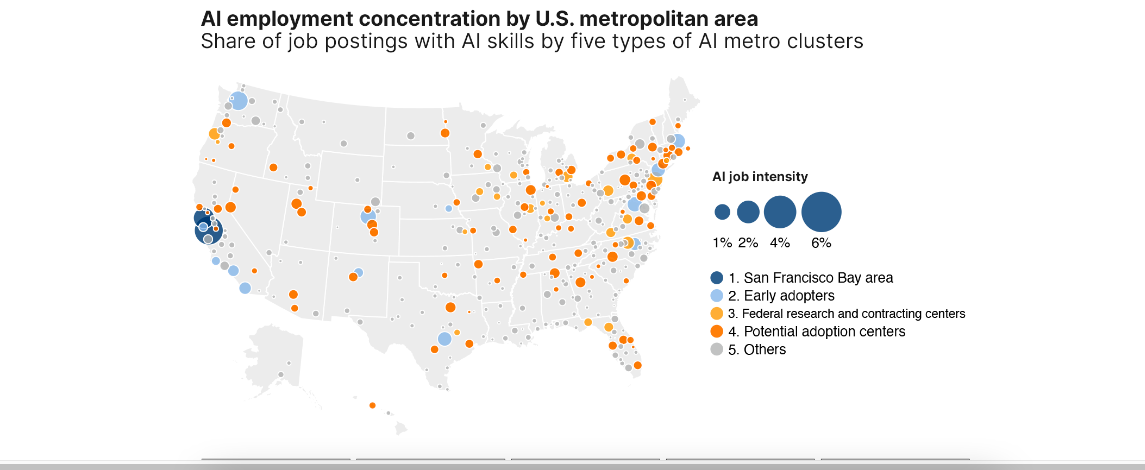Silicon Valley has long been recognized as the center of tech innovation. Now artificial intelligence is pushing the region into its next iteration. The outcome could end up driving a greater wedge between the haves and have nots.
San Jose and the Bay Area have become the nationwide hub for the AI industry, according to a 2023 report by the Brookings Institution, a D.C. based think tank. But, while artificial intelligence may boost the local economy’s productivity and bring more workers to the area, some advocacy groups worry the high concentration of AI jobs could exacerbate existing regional disparities.
Julian Jacobs, a research consultant at Brookings Institution who coauthored the report, said the data shows AI is leaning toward a concentration of opportunity, wealth, income and innovation in the same cities that previously benefited from tech innovations. He said the technology could lead to further stagnation for middle and lower income individuals.
“It almost certainly does have the capacity to widen disparities,” Jacobs told San José Spotlight. “The purpose of the report was to show that those inequalities are very geographic in nature.”
San Jose and San Francisco alone have about four times more AI companies, job postings and job profiles compared to the next 13 U.S. metro areas in 2023, according to the report. The two Bay Area cities were also home to about 25% of AI conference papers, patents and companies in 2021.

For 10 months prior to May 2023, San Jose and five other metro areas—San Francisco, New York, Los Angeles, Boston and Seattle—made up 47% of all AI job postings. The researchers also found a quarter of the 2,200 generative AI postings throughout the last year were in the Bay Area. They analyzed 380 metro areas in the nation.
San Jose also has two of the top 50 AI companies in 2023, Coactive AI and Vectra AI, according to Forbes. Coactive AI and Vectra AI did not respond to requests for comment.
Catherine Bracy, CEO and cofounder of Tech Equity Collaborative, said California lawmakers need to fend off disparities that could be caused by the industry. The advocacy group reviews structural inequity in the tech sector.
“We as the region, all of us who live here, and especially the elected officials and policymakers who are trying to figure out how to welcome tech growth, need to answer the question of: ‘How, when tech grows, (is) everybody, whether they work for a tech company or not, benefiting from that growth?’” Bracy told San José Spotlight.
Tech has done this before
According to the 2023 Silicon Valley Pain Index, which focuses on racial and wealth disparity in the region, there are already inequities present in Silicon Valley’s tech sector. Only 2% of Latinas work in the sector, while they make up about 13% of Santa Clara County’s population. Women are about 13% less likely to be interviewed for a tech position than a man, and about 33% of tech jobs interview men only. From September to December 2022, 47% of the tech layoffs were women, even though they made up about 39% of tech workers.
Russell Hancock, CEO of Joint Venture Silicon Valley, which focuses on issues affecting quality of life in Silicon Valley, said he hopes AI jobs make the area more equitable. Hancock is paying attention to how AI transforms high-paying jobs, which he said are commonly held by white and Asian employees.
“It’s eliminating high-end (jobs in the tech sector),” Hancock told San José Spotlight. “(White and Asian employees) are over-represented in those kinds of jobs. Now, here comes this level effect and that’s going to be interesting.”
Peter Leroe-Muñoz, senior vice president of technology and innovation at Silicon Valley Leadership Group, said the artificial intelligence boom in the region will lead to additional resources for the area, an influx of workers moving here and venture capital companies investing in AI companies.
Leroe-Muñoz also said the nonprofit formed the Working Group on Responsible AI in May. It is steered by local executives from Google and Johnson & Johnson to analyze the industry’s emergence. He said it will be important for AI companies to learn from Silicon Valley’s past mistakes. They need to find ways to diversify the workforce.
“This technology has so much potential to transform many different industries,” Leroe-Muñoz told San José Spotlight. “Any industry is going to potentially be affected by the use of AI going forward and really, we’re just seeing the very beginning.”
Contact Julia Forrest at [email protected] or follow @juliaforrest35 on Twitter.



Leave a Reply
You must be logged in to post a comment.